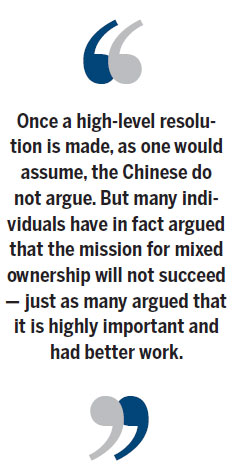Reform of government must come first
Updated: 2014-04-25 07:29
By Ed Zhang (China Daily Europe)
|
|||||||||||
Doubt over success of mixed ownership endeavor as state sector remains dominant
Indians are argumentative, so people say. Chinese are not, it seems. But right now in China there is a rather serious and healthy debate that may have to do with all investors' future interests - a debate about mixed ownership.
So-called mixed ownership is meant to allow large state-owned enterprises, which till now have held monopolistic power over many traditionally strategic industries, from energy to the postal service, to form joint ventures with private capital.

That is, to create mixed boards, as investors would say. This was officially listed as one of the national tasks by the top leaders in November to map out China's reform program.
Once a high-level resolution is made, as one would assume, the Chinese do not argue. But many individuals have in fact argued that the mission for mixed ownership will not succeed - just as many argued that it is highly important and had better work.
In an article by senior economist Zhang Zhuoyuan in the April 16 issue of the fortnightly journal Qiushi, published by the Communist Party of China Central Committee, the plan for a mixed economy was described as a "major achievement" by the leaders at November's meeting, and an "inevitable (meaning logical) product" of the China's reform and opening-up over the past 36 years.
In 1992, China decided to reform its economy into a "socialist market economy". In 1997, it accepted the joint-stock corporation as a more efficient system in capital use and organization for modern enterprises. In 2003, it continued the process by proposing that the joint-stock system, with access to plural equity investors, should be the mainstay of public ownership of enterprises.
By now, Zhang said, more than 90 percent of state-owned enterprises have been converted into joint-stock companies. The two domestic stock exchanges (Shanghai and Shenzhen) boasted 140 million active trading accounts in 2012. Mixed ownership is in fact a fait accompli in China, the economist said.
So, what last year's Third Plenum of the Party did, Zhang said, was to highlight the significance of mixed ownership as part of China's fundamental economic system, to encourage private capital to participate in SOE reform and thereby participate in the various mixed ownership schemes, and to allow workers' ownership of their companies' shares.
That sounds good, but many people remain doubtful, asking:
Can state capital and private capital really enjoy equal rights?

Can an SOE duly protect its private partners when the board is still dominated by officials representing state interests?
Can the board really decide on a mixed-ownership company's business targets and strategies without having them handed down by the government, or having to make extreme changes just to accommodate the whims of "somebody high above"?
Can the private-sector member of the board propose the dismissal of a government official-turned CEO on the ground of managerial incompetence rather than political disloyalty?
In the distribution of rights, can private capital increase its share to more than 30 or 35 percent of the equity structure, which is the commonly understood limit? If it never can, wouldn't this kind of mixed ownership, with its mixed terms always fixed, be yet another kind of cumbersome system that would harm efficiency and hinder competition?
At the same time, who in the private sector has the financial resources to acquire 30 percent of the shares of a giant state-owned industry monopoly?
According to a survey from the recent Boao Forum for Asia, in Hainan province, 90 percent of the private business leaders there said they would not have any influence if they sat on the board of a mixed-ownership company with state-sector officials. Up to 70 percent of them said they still felt uncertain about the current reform policies. And more than half said for the time being they had no plans to seek a state-sector mixed-ownership partner, preferring to wait and see "until the picture gets clearer".
A very important opinion was contributed by Yao Yang of Peking University. Yao alleged that many tasks from the Third Plenum, not just the task of spreading mixed ownership, would be difficult to carry out unless the state reforms itself and stops directly running the economy.
If mixed-ownership companies remain under government control, what is the point of having more of them, Yao asked.
It looks like China's economic reform has reached the point where every step forward will require more than a purely economic effort. The real challenge is government reform.
The author is editor-at-large of China Daily. Contact the writer at edzhang@chinadaily.com.cn
(China Daily European Weekly 04/25/2014 page19)
Today's Top News
EU: No armed intervention in Ukraine
Chinese premier visits Nigeria
Court to rule on Yingluck in Thailand
Travellers to Malaysia drop
Chinese to US grad schools drop
Ukraine moves special forces to Odessa
Slovenian PM resigns
Disclosure of military secrets becoming bigger risk
Hot Topics
Lunar probe , China growth forecasts, Emission rules get tougher, China seen through 'colored lens', International board,
Editor's Picks

|

|

|

|

|

|





